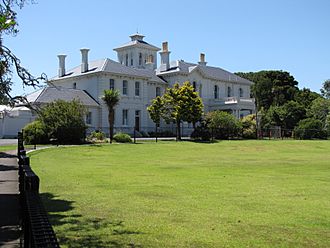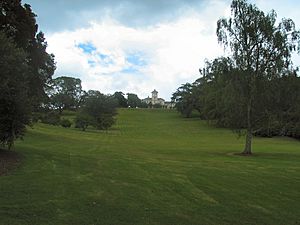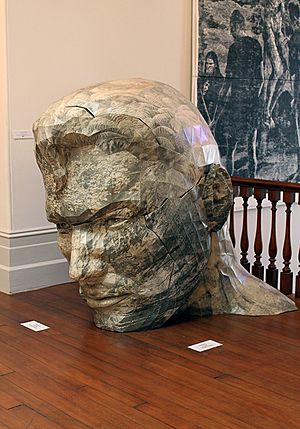Pah Homestead facts for kids
Quick facts for kids Pah Homestead |
|
|---|---|

The homestead in early 2009
|
|
| Former names | Monte Cecilia Monte Cecilia Convent Pah Farm The Pah |
| General information | |
| Type | Homestead |
| Location | Monte Cecilia Park |
| Address | Hillsborough Road, Hillsborough |
| Town or city | Auckland |
| Country | New Zealand |
| Coordinates | 36°54′52″S 174°45′48″E / 36.9145°S 174.7632°E |
| Completed | 1880 |
| Owner | Auckland Council |
| Designated: | 1 September 1983 |
| Reference #: | 89 |
The Pah Homestead is a very old and important house in Hillsborough, Auckland, New Zealand. It is located inside Monte Cecilia Park. The Auckland Council owns this beautiful building. Today, it is a popular art gallery. It shows off a huge collection of New Zealand art from the Arts House Trust. Since it opened in August 2010, many people have visited the gallery.
Contents
History of the Pah Homestead
The Pah Homestead was built between 1877 and 1879. It was designed for a rich Auckland businessman named James Williamson. He wanted a grand home. The architect, Thomas Mahoney, made it one of the biggest and best houses in Auckland at that time.
The house is made of brick covered in plaster. It looks like the Italianate style of architecture. Its design was inspired by Osborne House, a home belonging to Queen Victoria and Prince Albert in England. The long driveway, lined with trees, is still mostly there today. The park around the house has some of Auckland's most amazing foreign trees. From the house, you can see the Manukau Harbour and One Tree Hill.
Early Days of the Land
Before the house was built, this land was a fortified Māori village, called a pā. This was in the 1600s and 1700s. Later, in the early 1800s, there wasn't much left of the old village above ground. Some people think Pōtatau Te Wherowhero, who became the first Māori king, might have lived here for a few years.
In 1844, a man named William Hart bought the land. He built a house on the site in 1847. When they dug to build Hart's house, they found old tōtara wood fences. These fences might have been from the Māori pā. Hart made his farm bigger and grew crops like wheat. He also planted many special trees, including the largest hoop pine in New Zealand.
New Owners and Changes
In 1866, Thomas Russell bought the farm. He loved plants and added many interesting trees to the property. These included a Chilean wine palm and several Bunya Bunya pines. In 1872, someone tried to harm Russell at his home, but luckily, no one was hurt.
In 1877, James Williamson bought the property. He decided to tear down the old house. He wanted to build a much bigger and more expensive home. This new house was the Pah Homestead we see today.
Design and Features of the Homestead
The Pah Homestead was designed by Edward Mahoney & Sons. It's an Italianate villa, made to look like stone. It has wide porches, balconies, and a tall central tower. From the top of the tower, you could see all around, including One Tree Hill and the Manukau Harbour. The tower even had a telescope!
Inside, the main rooms have beautiful plaster ceilings and fancy Italian marble fireplaces. The floors are made of wood with special patterns. The windows are very large, and some of the glass panes are even curved! The house was filled with amazing furniture.
James Williamson hoped his family would live in this grand estate for many years. But after some financial difficulties in 1886, he had to sell the property. The land was then divided up for other buildings.
After Williamson passed away in 1888, the Bank of New Zealand took over the house. Later, the Anglican church leased it. In 1913, the Sisters of Mercy bought it. For a while, the house was used to help people who needed a temporary place to live.
On September 1, 1983, the Pah Homestead was officially recognized as a very important heritage building in New Zealand.
In September 2002, the Auckland City Council bought the Pah Homestead. They wanted to turn the land around it into a big park for the city, called Monte Cecilia Park. The council made plans to protect the old building and learn more about its Māori and European history.
Monte Cecilia Catholic School, which was next to The Pah, moved to a new building nearby.
Restoring the Pah Homestead
The council worked hard to fix up the Pah Homestead. They repaired the roof to make sure it was waterproof and strong. They used materials that matched the original roof, like English slate tiles.
The Auckland City Council worked with experts like the New Zealand Historic Places Trust to make sure the repairs were done very well. An Auckland construction company, NZ Strong Construction, did the work.
They also fixed the outside parts of the house and improved the drainage and fire safety. This helped stop the building from getting worse.
The Arts House Trust Gallery
The restored building opened to the public in August 2010. It is now called the TSB Bank Wallace Arts Centre. It holds the Wallace Arts Trust's collection of New Zealand art. This collection has more than 7,000 artworks by New Zealand artists! In 2021, the trust changed its name to the Arts House Trust.
You can visit the gallery and see the art and special exhibitions for free. For example, in 2012, there was an exhibition by the artist Vincent Ward called Exhale.
Filming Location
Over the years, the Pah Homestead and its grounds have been used as a setting for several movies and TV shows.
- The Quiet Earth (1985)
- Gloss (1987)
- Lucy (2003) (TV movie)
- Ike: Countdown to D-Day (2004) (TV movie)
- The Chronicles of Narnia: The Lion, the Witch and the Wardrobe (2005)
 | Jackie Robinson |
 | Jack Johnson |
 | Althea Gibson |
 | Arthur Ashe |
 | Muhammad Ali |



